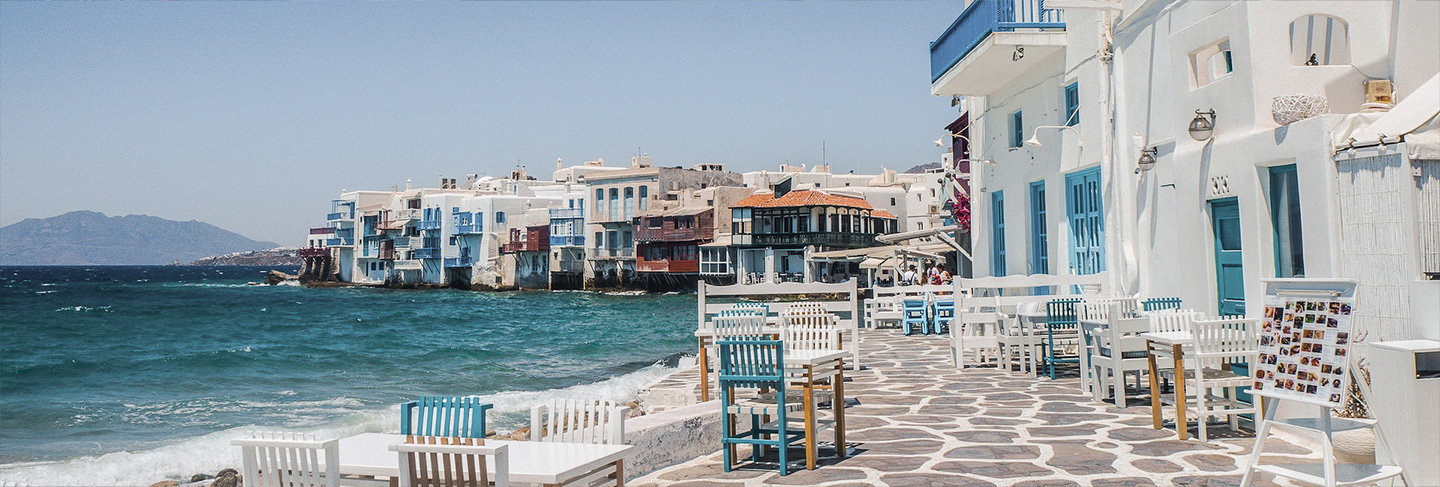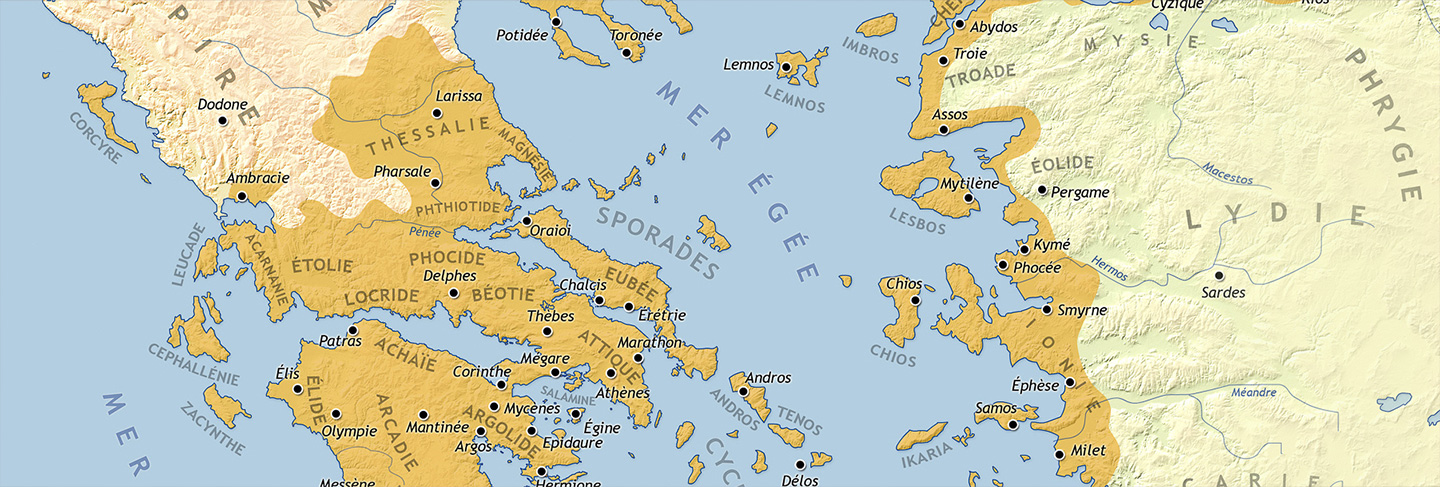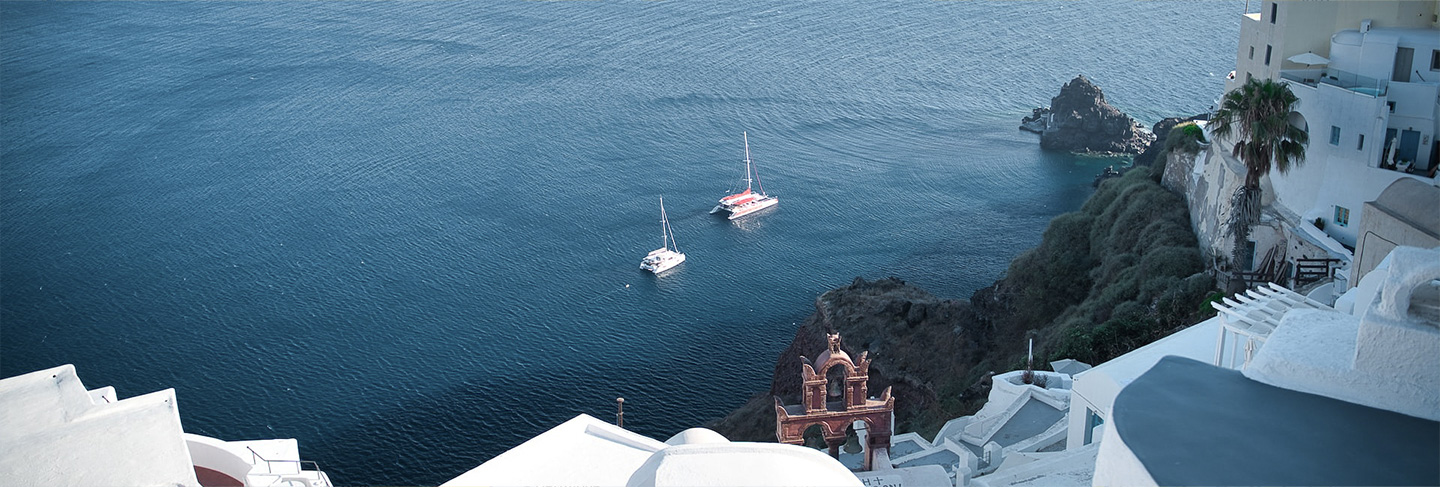With its countless paradisical beaches, quaint tavernas serving world-class cuisine, unparalleled cultural wealth and famously hospitable locals, sun-soaked Greece has everything you could wish for from a perfect holiday destination. In fact, the only drawback is that you may be too spoilt for choice!
Our practical guide to Greece aims to help you choose where and when to go and how to make the most of your heavenly Hellenic getaway.
Greece, or the Hellenic Republic as it is known officially, is located at the cultural and geographical crossroads of Europe, North Africa and the Middle East. It is made up of a mainland situated at the southernmost point of the Balkans, and between 1200 and 6000 islands (depending on your definition) - around 200 of which are inhabited.
It shares a land border with Albania and North Macedonia and Bulgaria in the north and Turkey in the northeast.
Besides the land borders of the north, the rest of Greece is surrounded by water. In fact, it boasts the longest coastline in Europe and is touched by no less than five seas (although some are sub-divisions of others): moving anti-clockwise from the Ionian Sea to the west to the Mediterranean Sea, the Libyan Sea, Myrtoan Sea in the south and The Aegean Sea to the east.
Within the Ionian Sea, which it shares with the ‘bootheel’ of Italy, you can find the popular former venetian island enclave of Corfu, as well as the stunning islands of Lefkada, Ithaca, Zakynthos (Zante) and Kefalonia.
The waters of the northern Mediterranean - so important to the ancient Greeks that they used to refer to it as he hemetera thálassa (‘our sea’) - meet the mainland cities of Athens and Thessaloniki.
Meanwhile, the popular island chains of the Cyclades, Sporades, and the southern Dodecanese region can be found within the broader Aegean Sea.
The island of Crete (the fourth largest in the Mediterranean) divides the Aegean to the north and the Libyan Sea to the south, while the Myrtoan Sea – a subdivision of the Aegean – sits between the Cyclades and the peninsula of Peloponnese.
The north of the mainland has thick ancient forests and great swathes of mountains (including the mythical playground of Olympus, of course), and boasts lakes and wetlands (particularly towards the west).
As we move further south, we find the regions of Attica, in which we include the capital, Athens – a city that requires no introduction – and Peloponnese, the storied peninsula which is connected to Attica through the natural land bridge of Corinth.
Due to Greece’s distinctive geography, the further south you go the less sense it makes to distinguish between the barely connected phalange-like peninsulas of the mainland and the islands that are scattered around them. All is surrounded by azure waters and sumptuous beaches.
Given the country’s reliably sunny climate, it can be visited all year round. Indeed, some may prefer to visit to escape the winter blues, when they will also find many of the more touristy areas less congested. Tourist season in Greece takes off between Easter and October. With July and August both the hottest, and especially crowded. However, given the sheer diversity of locations available to you, those seeking a quieter break even in the summer can do so.
For many, however, the best time to visit is late spring or in the autumn (typically, 24-28C highs and lows of between 16-20C) – although some tourist sites might be closed or operating on shorter hours. Check with our team when you are looking to visit, and they can advise you.
Due to its particular geography and status as a wildly popular tourist destination, Greece has no shortage of international airports, both on the mainland and the main island chains, many of which enjoy direct flights from the UK and other European countries via both major and budget airlines. Those which cannot be reached directly, require a brief change in Athens or one of the other major airports.
Greece can also be reached from the north by trains coming through Bulgaria, Serbia or Macedonia, or even by crossing the Adriatic in ferry from Italy (including from Bari or Venice). Ferryhopper.com is a useful aggregating sight offering a range of options and prices.
Once there, the network of airports offering short haul flights and boats offering direct journeys, and even island-hopping trips between the islands, are plentiful.
The following Greek islands have airports: Crete, Skiathos, Rhodes, Karpathos, Mykonos, Santorini, Paros, Naxos, Corfu, and Kefalonia.
Taxis are widely available throughout major Greek cities but should be subject to the same care you would take in any other part of the world: agree a price with the driver beforehand or ensure that the meter is turned on from the outset of the journey. There is often an extra price included for luggage. Most taxis in Athens are yellow, but there are black hire cars, especially around the airport, which charge far more than the standard taxi.
The Greek people are friendly and hospitable, but a tourist in any country can fall foul to scams – and Greece is no exception. If you’re unsure about the prices, our local concierge can advise you. Alternatively, you can use UBER or the more popular in Greece BEAT app.
Meanwhile, public transport in the major cities is excellent, with bus and metro options available.
On the islands, however, there are far fewer taxis and less available public transport. If you find one you are happy with, it is advisable to get their business card. Again, our concierge service can help you with any issues moving around the islands. Of course, to go island hopping, the option of a taxi boat is always available. While in Hydra, the blanket ban on cars means that donkeys are used to carry goods around the island!
Finally, renting a car is an excellent way to get around Greece, and even to the islands where you can take them via ferry. While you may not need an international driver’s licence to rent a car, you do need to provide one if you are stopped by police or unfortunate enough to find yourself in an accident. These can be obtained in your home country.
Some of the more rural areas have winding roads that require some patience. Always consider taking out full insurance, as the Greeks’ reputation for somewhat reckless driving isn’t entirely without foundation - particularly in Athens. And for those travelling from the UK: remember that in Greece they drive on the right, and right of way is given to those on the right. This even applies on roundabouts, meaning cars even will stop on a roundabout to allow a car to enter!
Greece uses the Euro and the type C (classic European, two-pronged) plug, (Standard voltage of 230v and standard frequency of 50Hz).
ATMs can be found all over, but you can use credit cards in most cases.
Travel insurance would be advisable for those looking to try adventure activities and sailing. Those travelling from the UK can apply for the Global Health Insurance Card (GHIC), which will replace the European equivalent EHIC, in order to obtain free or discounted medical care. Those with valid EHIC cards can continue to use them until their expiration.
Covid – please read the https://travel.gov.gr/#/ website for up-to-date travel advice.
Travelling with medication: according to Greek law, a visitor can bring up to 5 different prescribed medicines for personal use, with a maximum of 2 boxes of each medicine. Should you need more, you should contact the Greek National Organisation of Medicines (relation@eof.gr).
Be aware that some prescribed medications, as well as those that can be sold over the counter in the UK, may contain substances (such as codeine) that are controlled in Greece. A doctor’s note would be required for the entry of such substances.
And if you want to say ‘cheers’ in Greek, you can say “Gia mas”.
Meanwhile, Greeks wave with the palm closed. To wave with he palm opened can be considered an insult – so try to avoid it!
Athens is one of the oldest cities in the world, having been inhabited since around 5000BC!
Despite having the largest coastline in Europe, due to its peculiar geography – with 80 percent of the country taken up by mountains - Greece does not possess any navigable rivers.
Greece is the third largest producer of olive oil (behind Spain and Italy), but the largest consumer. Some of the trees still producing olives were planted in the 13th century!
The evil eye is a common superstition. It can be warded off, thankfully, by wearing blue eye charms or blue beads. As a result, jewellery and other ornaments in the shape of a big blue eye can be found throughout Greece, and even explains the blue-painted rooftops in Cycladic architecture.
Greece is the country with the most archaeological museums in the world and 18 Unesco Heritage sites.
Greece is the number one country in the world in the production of natural sponges.
And perhaps most importantly… Greece enjoys over 250 days of sunshine per year!








